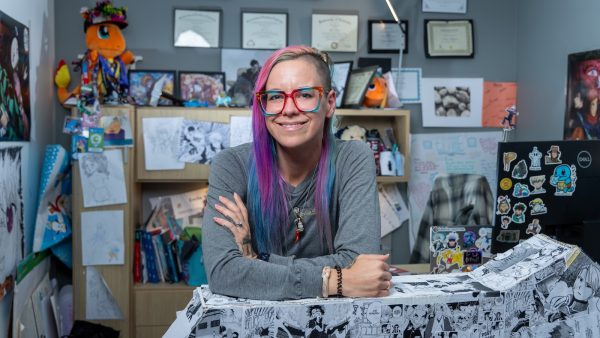Emilie Waggoner, director of student transitions at the University of Colorado Denver (CU Denver), is transforming the academic experience for first-generation college students through her innovative course, Anime Goes to College. By integrating the popular medium of anime into her curriculum, Waggoner helps students navigate the often daunting transition to higher education while promoting a sense of belonging and personal growth.
Creating Authentic Spaces in Education
Waggoner, who is known for her vibrant appearance—with rainbow glasses, tattoos inspired by the anime series Jujutsu Kaisen, and ever-changing hair colors—encourages her students to embrace their true selves in the classroom. “When you are making any kind of big transition, it can be scary,” Waggoner explained. “Anime tends to have magical world elements that show exactly that. How do you figure out your place in a new world? That’s what a lot of our students are doing.”
The course, which is part of CU Denver’s Lynx Summer Academy, serves as a vital resource for first-generation students, providing them with tools to reflect on their identities and aspirations. Waggoner emphasizes the importance of self-expression from the very beginning, stating, “When students see a character who they love going through the same struggles, it helps them reframe their own challenges.” This approach not only aids in acclimating students to college life but also fosters a supportive community.
Academic Rigor Meets Pop Culture
Waggoner’s expertise extends beyond her role as an instructor; she is also a dedicated scholar currently pursuing a Doctor of Education at CU Denver. Her research delves into themes of anime fandom, identity development, and student transitions. In the summer of 2025, she will deliver the keynote address at the JAMS@AX Academic Symposium during the Anime Expo in Los Angeles, which attracts over 100,000 attendees each year.
With her unique blend of passion and scholarship, Waggoner aims to demonstrate to students that they can both excel academically and embrace their interests. “You can be a serious scholar and still love anime. You can have pink hair and still publish academic research,” she asserts. This philosophy is reflected in her course structure, where students engage with peer-reviewed articles, write analytical papers, and apply developmental theories through the lens of anime and media studies.
“When they read peer-reviewed research on anime, it blows their minds,” Waggoner said. “They see themselves reflected in scholarship for the first time. That’s where confidence blooms.” The positive feedback from students validates the effectiveness of her approach, with one remarking, “I feel smarter every time I leave this class.”
Exploring Identity Through Storytelling
Waggoner appreciates that anime often grapples with profound questions such as purpose, failure, and personal identity—questions that resonate with many college students. “These are the same questions students ask when they come to college,” she noted. Her course encourages students to confront these inquiries through narratives that mirror their own life experiences.
By the semester’s end, students gain more than just academic credits; they leave with a richer understanding of themselves and others. Waggoner hopes to equip them with the language to articulate their experiences. “When they hit something difficult, like a bad grade or a team conflict, they’ll think back to these stories and theories and say, ‘OK, I know how to move through this,’” she said.
Through her innovative curriculum and genuine dedication to student success, Emilie Waggoner is not only making the transition to college easier for first-generation students but also empowering them to embrace their identities in a supportive environment. Her work exemplifies the profound impact that creative teaching methods can have on student engagement and self-discovery.
